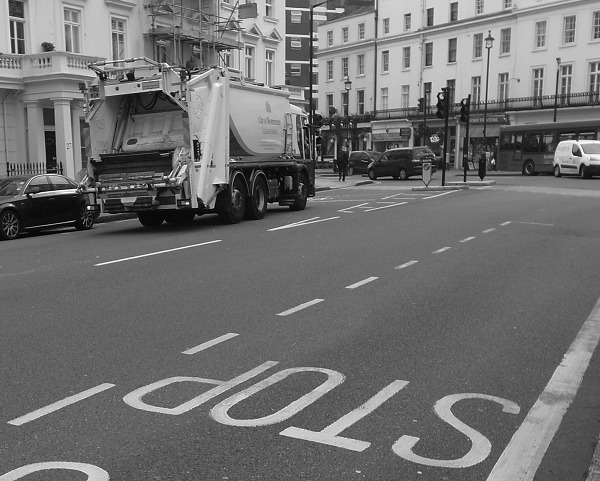Trade groups air concerns as DVS guidance published
 The UK’s foremost road haulage representative groups, the Road Haulage Association (RHA) and Logistics UK, have warned that Transport for London (TfL) has not taken into account industry concerns around the forthcoming enhanced Direct Vision Standard (DVS) requirements, following the publication of new guidance and technical standards for the scheme.
The UK’s foremost road haulage representative groups, the Road Haulage Association (RHA) and Logistics UK, have warned that Transport for London (TfL) has not taken into account industry concerns around the forthcoming enhanced Direct Vision Standard (DVS) requirements, following the publication of new guidance and technical standards for the scheme.
The groups’ concerns centre on the Progressive Safe System, which prescribes a list of technology with which HGVs over 12 tonnes must be fitted in order to operate on London’s roads from October 2024, for models where levels of direct vision from the cab are deemed to be otherwise insufficient under the rules of the DVS scheme.
Vehicles with less than a three-star DVS rating will need to have fitted the Progressive Safe System (PSS) by 28 October next year, although a three-month grace period will be available for operators who have registered eligible vehicles with TfL and provided evidence that they have an appointment with a fitter to install the necessary equipment before 31 January 2025.
TfL has recently released an updated DVS guide for operators, which reflects the enhanced DVS and PSS requirements. It provides an overview of the HGV safety permit scheme, and the requirements for acquiring one.
In addition, TfL has published detailed standards for how the PSS equipment should be installed, to ensure operators and fitters are apprised of the requirements. This includes detailed technical specifications for two required sensor components: blind spot and moving off information systems.
The new guidance is available here, and replaces previous safety permits guidance published in 2019.
In a joint statement released last week, Logistics UK and the RHA said: “[We] are fully committed to improving the safety of all road users, and putting in place workable solutions that reduce the risk of road fatalities.
“However, the industry has already raised concerns over the proposed changes to the scheme – which will place a huge onus on operators, with no regulatory oversight from TfL and no accreditation process for the new regulations.
“Tighter safety standards for DVS for HGVs operating in the capital are due to be introduced in October 2024, by which time operators will be required to replace equipment already installed by the sector in good faith to meet the current ‘safe system’ but which may not meet the revised standard.
“In addition, TfL has not made clear why existing kits may need to be replaced under the new requirements.”
While the trade bodies reiterated their support for the Mayor’s Vision Zero road safety strategy, including continuous improvements to ensure vehicles’ safe operation, they warned that: “short lead-in times, a lack of available kit and a dire shortage of qualified fitters for it will make it impossible for the industry to prepare and be ready for the changes next autumn.
“Hauliers need certainty to understand what they are expected to do to ensure they plan ahead and invest in the right equipment. They also need assurances that further changes will not be necessary once the new equipment is installed.
“Manufacturers and suppliers will also need to understand what their customers will be required to do to ensure that they can service that demand.”
The trade groups concluded: “The RHA and Logistics UK are committed to continued partnership and collaboration with TfL and other stakeholders to help prepare the industry for the changes ahead.”
James Ashford, head of UK connected services at vehicle safety specialist Brigade Electronics, told the Logistics UK Transport Manager conference in Somerset that the Progressive Safe System might indeed entail the replacement of equipment already fitted to achieve conformity with existing DVS Safe System requirements.
Some existing side warning systems would need to be removed, for example, and replaced with a sophisticated side warning system that would alert drivers to risk of an imminent collision with a moving object.
The introduction of the initial DVS was delayed by Transport for London because of issues arising from the Covid crisis in 2020, but Mr Ashford warned this was unlikely to happen in 2024. He said that operators ordering new trucks now should be careful to specify the fitment of a Progressive Safe System if they thought the truck might need to go into London. The upgrading of existing vehicles to the new standard should also be planned.
“A shortage of suitable equipment can be expected if you leave it until the last minute: don’t expect any further extensions from TfL this time, it’s going to happen in October 2024,” he warned.
Announcing the publication of the new standards, Christina Calderato, TfL’s director of transport strategy and policy, said: “Since we introduced London’s pioneering Direct Vision Standard, we have seen a dramatic reduction in fatal collisions where vision is a contributing factor in the capital.
“However, there is much more we need to do achieve our goal of eradicating deaths and serious injuries from London’s transport network. We will continue to take every possible measure to do so and our updated guidance and standards for the DVS scheme is a key part of that.”
The walking and cycling commissioner, Will Norman, added: “The Mayor and I are determined to eradicate death and serious injury on our roads, and improving HGV safety is a huge part of that. London’s Direct Vision Standard has been instrumental in reducing fatal collisions in the capital and this updated guidance will improve lorry safety even more and help make our streets safer for everyone.”










